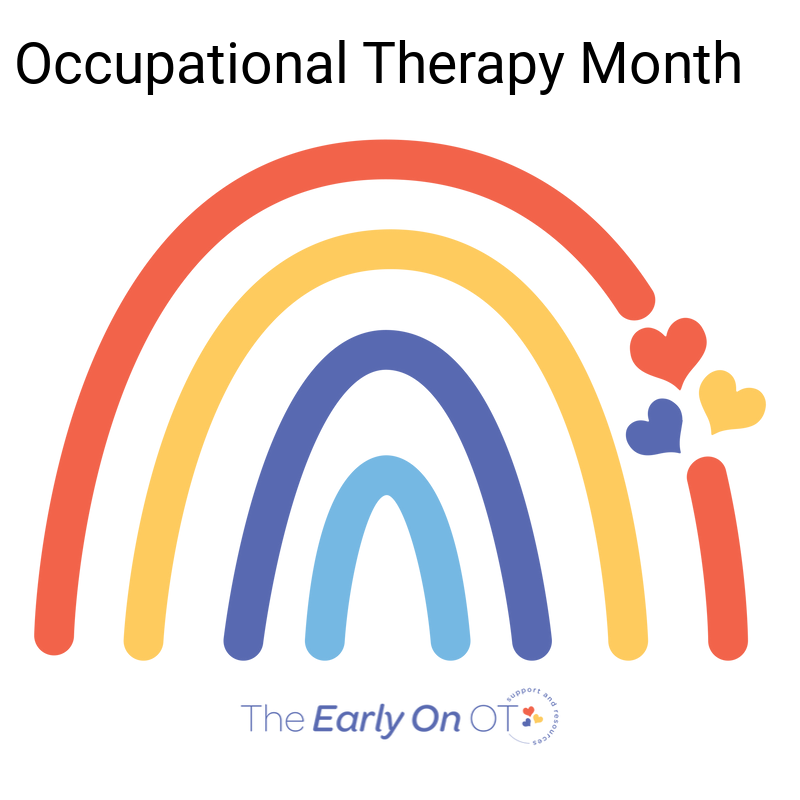It is Occupational Therapy Month!
- Teri
- Apr 11, 2022
- 4 min read

April is the month we get to rave a little about the profession we love so much! I am so excited to share a little more about what OT’s do in Early Intervention and a little bit about our overall culture and what it means to be an OT!
What do OT's do?
OTs as a discipline are focused on the human occupation. What is the Human Occupation you ask? The human occupation is all things a human does during their day. As you might imagine this is a pretty large array of tasks which differs along the lifespan. In other words a child's occupations are different from that of an adult. It also differs from one person to another. You may have very different occupations that someone else, but you will also have some that are in common. The other part of this equation is the need for meaning and purpose. As humans we are innately looking for meaning or purpose in our daily lives. As with occupations, what fills this for you versus another may be different and what those things are across your lifespan will differ. Finally the idea that we treat the whole person. We look at the mind and body when working with people.
Let us dig down a bit more into the idea of Human Occupation...
Human Occupation is all things we do in a day. Those include ADLs- Activities of Daily living- bathing, dressing, grooming, cooking, cleaning and grocery shopping to name a few. We also look at things such as sleep, eating and the ability to regulate ourselves. Leisure is an important part of your human occupation. What you do as leisure/play. Someone might say gardening another might say kayaking. Whatever you do during your leisure time is fair game. We also look at the work aspect. Yes this is what most people think we do. Although we do focus on one's work or job as a portion of the human occupation it is just one part of our focus. Finally we consider social participation which fits into a variety of the above mentioned tasks.
OT’s in Early Intervention
The most common question I receive when I tell people I work with children birth through age 3: “What could you possibly do with a newborn? They don’t do anything.” They look at me very perplexed. I am pretty sure I light up when people ask this question. My reply, “Since you asked…..” And so the story goes:
Babies have so many things happening all at once. They are learning how to tolerate all the new sights and sounds outside the womb. They are learning how to eat and what it means to be hungry. Babies are learning how to advocate for their needs by crying to let us know something is wrong or smiling and cooing to let us know they like something. They are coordinating sucking, swallowing and breathing. They are learning how to move their bodies. Seeing that their hands and feet are theirs! They are working on regulating their temperature. Their bodies are working on the digestion of foods and the elimination process of digestion. They are learning to sleep and how to self soothe. 0-3 is the greatest leap in cognitive ability in one's lifetime. To say the least, babies do so much! And this is just the tip of the iceberg.
Occupational therapists are masters of task analysis. We must be proficient in this skill because there is no book that defines every human. Families and children differ in so many ways and therefore we must be able to adapt and adjust our interventions and strategies to each family. We are helping families learn about their children, which helps them to implement the interventions and strategies we provide. We are helping them to become advocates for their children. These steps allow children to grow and thrive in their homes which are their natural environment. The place where they feel the most at ease to have trials and errors. Each home that we enter has different priorities, concerns and environments that the OT must analyze and break down. We will then teach the family the strategies and interventions that they will implement. This is so empowering for the families as they are becoming even more knowledgeable about who their child is and what helps them most!
Early Intervention has a holistic approach. This sits perfectly within an OT’s wheelhouse. We are able to look at all the routines a child needs to participate in their day. This includes bathing, dressing, grooming, eating, sleeping, helping with adult tasks, playing and self-regulation just to name a few. We work with their family to determine where the struggles are. We find the family's priority. We look for interventions and strategies that pair well with their priorities. The OT is then able to ensure the child is moving forward in all areas of development. We are also keeping true to the idea of meaning and purpose utilizing tasks that create a sense of accomplishment and pride as well as inclusion as a part of the family unit.
In Summary
As an OT, Early Intervention feels like the most at home I could possibly be. I am able to use all of my knowledge in one place while tapping into the holistic approach that is so meaningful to us. If you know an OT make sure to tell them thank you! It's the month to do so.


Hozzászólások